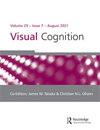移动以保持感知和社会的恒定性
IF 1.4
4区 心理学
Q3 PSYCHOLOGY, EXPERIMENTAL
引用次数: 0
摘要
摘要过去关于物体恒定性的研究倾向于将观察者视为被动的观察者。在这里,当观众被要求在画廊环境中观看人们的照片时,我们会检查他们的身体和眼球运动。参与者在每张照片中考虑一个人,然后表明他们对自己的社交关系,然后转移到画廊中与他们交谈时最舒服的地方。拍摄的个体与相机的投影距离(近、远)和图像分辨率(清晰、略微模糊)各不相同。结果显示,参与者更直接地观察近距离与远距离的个体,以及尖锐与模糊的个体。他们还认为,当图像近与远、清晰与模糊时,他们的社会联系更强。参与者在进行这些评级时所处的位置与图像的投影距离和他们对社会联系的评级密切相关。这些发现是关于维持我们对世界几何和社会方面感知稳定的大脑机制的讨论。它们还突出了我们将感知体验的品质归因于那个世界中的物体的内在倾向。本文章由计算机程序翻译,如有差异,请以英文原文为准。
Moving to maintain perceptual and social constancy
ABSTRACT Past research on object constancy has tended to treat the viewer as a passive observer. Here we examine viewers’ body and eye movements when they are asked to view photos of people in a gallery setting. Participants considered one individual in each photo, before indicating how socially connected they felt toward them and then moving to a spot in the gallery where they would be most comfortable when talking to them. Photographed individuals varied in their projected distance from the camera (near, far) and in their image resolution (sharp, slightly blurred). Results showed that participants looked more directly at near versus far individuals and at sharp versus blurred individuals. They also rated their social connection as stronger when the images were near versus far and sharp versus blurred. Where participants stood when making these ratings was strongly correlated with the projected distance of the images and with their ratings of social connection. These findings are discussed with regard to brain mechanisms for maintaining stability in our perceptions of geometric and social aspects of our world. They also highlight our inherent tendency to attribute qualities of our perceptual experiences to objects in that world.
求助全文
通过发布文献求助,成功后即可免费获取论文全文。
去求助
来源期刊

VISUAL COGNITION
PSYCHOLOGY, EXPERIMENTAL-
CiteScore
4.20
自引率
10.00%
发文量
29
期刊介绍:
Visual Cognition publishes new empirical research that increases theoretical understanding of human visual cognition. Studies may be concerned with any aspect of visual cognition such as object, face, and scene recognition; visual attention and search; short-term and long-term visual memory; visual word recognition and reading; eye movement control and active vision; and visual imagery. The journal is devoted to research at the interface of visual perception and cognition and does not typically publish papers in areas of perception or psychophysics that are covered by the many publication outlets for those topics.
 求助内容:
求助内容: 应助结果提醒方式:
应助结果提醒方式:


